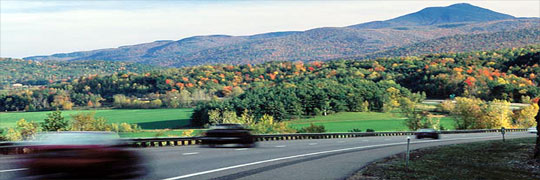Win $300 Million
McCain proposes: build a better car battery and you could win a large sum of money - $300 million to be exact. [Source:
New York Times]
Oil Rally
Will the oil price push follow in the footsteps of the dot-com rise and fall of 2000? [Source:
Bloomberg]
Biodiesel Business
The EU will investigate the U.S. exports of biodiesel. [Source:
New York Times]
Roadway Runoff
How to green the highways... [Source:
Boston Globe]
Need to Get Around
The 2001 Segway hype may be back as sales are sailing. [Source:
Wall Street Journal]
Mr. President
Bush looks to offshore drilling to remedy high oil prices. [Source:
CNN]
Oil Advertisements
Oil companies do everything they can to ward off anger over gas prices. [Source:
Wall Street Journal]
Hydrogen
Honda unveils first hydrogen fuel cell vehicle intended for mass production. [Source: New York Times]
Hybrid SUVs
Chrysler wants a piece of the hybrid market and looks to SUVs as their niche. [Source: San Francisco Gate]
MPG or GPM
A recent study published in Science Magazine says rating vehicles based on gallons per mile rather than miles per gallon would help consumers better understand their savings. [Source:
EE News]
I Walked to School Up Hill Both Ways...
The cost of fuels may have more students walking to school next year. [Source:
Washington Post]
 A report released recently by the Vermont Clean Cities Coalition Vehicle shows that while miles traveled in Vermont are less this year than in the previous three years, expenditures on fuel continues to increase. Hybrid purchases have increased to 3% of all new vehicles purchases, whereas gasoline-only powered vehicles have decreased by 2%. The full report can be viewed here.
A report released recently by the Vermont Clean Cities Coalition Vehicle shows that while miles traveled in Vermont are less this year than in the previous three years, expenditures on fuel continues to increase. Hybrid purchases have increased to 3% of all new vehicles purchases, whereas gasoline-only powered vehicles have decreased by 2%. The full report can be viewed here.























 Vehicle miles traveled (VMT) in the U.S. have decreased for the 6th straight month. The number of highway miles driven from November 2007 to April 2008 in the U.S. fell 1.7 percent from the previous year. Public transit ridership continues to increase as a total of 30 billion fewer miles were driven between November and April. Cambridge Energy Research Associates say the gasoline price shock has finally caught up with consumers. This is the "steepest decline" in U.S. driving mileage since the 1979-1980 Iranian Revolution that caused the oil shock resulting in a significant drop in mileage over those two years, said the Department of Transportation's spokesman Doug Hecox. In April of this year alone Americans drove 1.4 billion fewer highway miles than they did in April 2007. [Source:
Vehicle miles traveled (VMT) in the U.S. have decreased for the 6th straight month. The number of highway miles driven from November 2007 to April 2008 in the U.S. fell 1.7 percent from the previous year. Public transit ridership continues to increase as a total of 30 billion fewer miles were driven between November and April. Cambridge Energy Research Associates say the gasoline price shock has finally caught up with consumers. This is the "steepest decline" in U.S. driving mileage since the 1979-1980 Iranian Revolution that caused the oil shock resulting in a significant drop in mileage over those two years, said the Department of Transportation's spokesman Doug Hecox. In April of this year alone Americans drove 1.4 billion fewer highway miles than they did in April 2007. [Source: 

 Premium gas sales are falling, while cars requiring the higher-octane fuel are rising. In 1997 premium fuel sales held 16.6 percent of the market, in 2007 they claimed only 9.4 percent. From 2006 to 2007 premium sales dropped 0.1 percent. Nevertheless, this year there are 282 new vehicles requiring the fuel, in 2002 only 166 new vehicles required premium as their fuel. Drivers, however, regardless of their car requesting or requiring the fuel are deciding regular or midgrade will do. As a result, gas stations around the nation have been running out of the lower grade fuels for up to two days. Measured by volume, premium sales in March 2008 were 0.4 percent lower than in April 2007. [Source:
Premium gas sales are falling, while cars requiring the higher-octane fuel are rising. In 1997 premium fuel sales held 16.6 percent of the market, in 2007 they claimed only 9.4 percent. From 2006 to 2007 premium sales dropped 0.1 percent. Nevertheless, this year there are 282 new vehicles requiring the fuel, in 2002 only 166 new vehicles required premium as their fuel. Drivers, however, regardless of their car requesting or requiring the fuel are deciding regular or midgrade will do. As a result, gas stations around the nation have been running out of the lower grade fuels for up to two days. Measured by volume, premium sales in March 2008 were 0.4 percent lower than in April 2007. [Source: 



 Many people are planning on vacationing closer to home this summer in response to high gas prices. Others have crossed the idea of a vacation out altogether. As a result, resorts, inns, and vacation destinations across the nation including Vermont are opting to provide further incentives to possible vacationers who may be weary of making the trip. Gas credits are the number one incentive many places trying to attract travelers are offering. Some vacation spots, such as the Wilder Farm Inn in Waitsfield Vermont are taking it even further offering, however, rebates for those who drive hybrids or carpool to get to their inn. The Iannuzzi's, owners of the Wilder Farm Inn, have said that four people have already taken advantage of the deal. [Sources:
Many people are planning on vacationing closer to home this summer in response to high gas prices. Others have crossed the idea of a vacation out altogether. As a result, resorts, inns, and vacation destinations across the nation including Vermont are opting to provide further incentives to possible vacationers who may be weary of making the trip. Gas credits are the number one incentive many places trying to attract travelers are offering. Some vacation spots, such as the Wilder Farm Inn in Waitsfield Vermont are taking it even further offering, however, rebates for those who drive hybrids or carpool to get to their inn. The Iannuzzi's, owners of the Wilder Farm Inn, have said that four people have already taken advantage of the deal. [Sources: 



